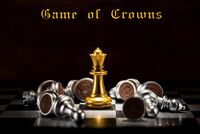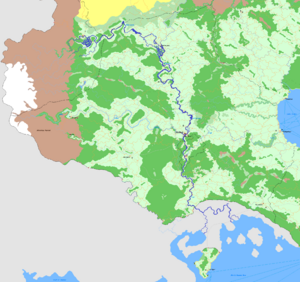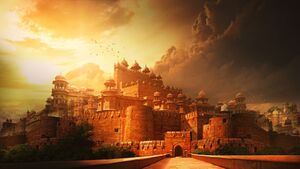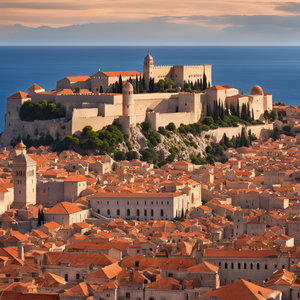Xunpadshahannama: Game of Crowns: Difference between revisions
No edit summary |
No edit summary |
||
| Line 170: | Line 170: | ||
The time had finally come, the first state highway was opened. After years of arm-wrestling with Agra for a national highway in the most populous state in the Empire, [[Karel Kyle|Karel]] decided to pay for the construction of at least the first state highway himself. The roads are quite congested, the trains overloaded. Ideas of more ships crossing the rivers were limited by the introduction of dams. Since the [[1728 Khordad Floods|floods of 1728]], rivers were more curbed by runoff canals, dams and overflow dams. Zahra's thunderous sermon to him when he had presented a highway plan just before, made him decide it was his turn to move his state forward independently. | The time had finally come, the first state highway was opened. After years of arm-wrestling with Agra for a national highway in the most populous state in the Empire, [[Karel Kyle|Karel]] decided to pay for the construction of at least the first state highway himself. The roads are quite congested, the trains overloaded. Ideas of more ships crossing the rivers were limited by the introduction of dams. Since the [[1728 Khordad Floods|floods of 1728]], rivers were more curbed by runoff canals, dams and overflow dams. Zahra's thunderous sermon to him when he had presented a highway plan just before, made him decide it was his turn to move his state forward independently. | ||
But financing was not easy. He had wanted to involve investors from [[Manbai]], but they wanted an immediate connection to the national highway at Padaudah. Only guaranteeing further investment in highways beyond [[Maulikpur]], they did not come. So he decided and now opens with grand ceremony the first state highway between [[Ambarganj]] and Maulikpur. The route follows the Adaraney river on its eastern side. This is considered the easiest route construction-wise. The route on the west side of the river is easy only between Akbarabad and Maulikpur. The marshland and ridge west of Ambarganj are more difficult to traverse and hence more expensive. A small section of the western route does get built and that is the section from Maulikpur to the airport. | But financing was not easy. He had wanted to involve investors from [[Manbai]], but they wanted an immediate connection to the national highway at Padaudah. Only guaranteeing further investment in highways beyond [[Maulikpur]], they did not come. So he decided and now opens with grand ceremony the first state highway between [[Ambarganj]] and Maulikpur. The route follows the Adaraney river on its eastern side. This is considered the easiest route construction-wise. The route on the west side of the river is easy only between [[Akbarabad]] and Maulikpur. The marshland and ridge west of Ambarganj are more difficult to traverse and hence more expensive. A small section of the western route does get built and that is the section from Maulikpur to the airport. | ||
In a convertible, the Chhatrapati drove through a stretched ribbon, as if he had driven the entire route from Ambarganj. This moment of euphoria momentarily hid his dream of a complete network of highways and local railway lines. He had to smile that his cousin, the Prince of Leyl, did not want a highway in his Sadarya. | In a convertible, the Chhatrapati drove through a stretched ribbon, as if he had driven the entire route from Ambarganj. This moment of euphoria momentarily hid his dream of a complete network of highways and local railway lines. He had to smile that his cousin, the Prince of Leyl, did not want a highway in his Sadarya. | ||
Revision as of 08:53, 12 August 2024
| Xunpadshahannama: Game of Crowns | |

| |
| Original title | Xunpadshahannama |
| Language | Common Tongue |
| Author(s) | Gustaaf Vermeylen |
| Genre | Historical narratives |
| Location(s) | Çakaristan |
| (main) characters | list of characters |
| Timeframe | 1728 and onwards |
Xunpadshahannama: Game of Crowns is the first part in the story series Xunpadshahannama. This Book of Xunpadshahan is the official chronicle of the reign of Xunpadshahan. It contains various stories surrounding the Shahanshah, the third ruler of Çakaristan.
Starting at the beginning
"Your majesty, you had summoned me," Abu Turbati spoke, taking a bow. "Yes, grand vizier, I have made a proposal to amend the constitution," said Xunpadshahan, handing over a paper. The grand vizier took it and read it. "Your majesty, your father would be proud of you." Xunpadshahan immediately interrupted the grand vizier in a rage, "My father...". Snorting heavily, the Shahanshah searched for words. "My father, was too weak to tackle that Hrithik!" he roared. The grand vizier bowed his head and thought quickly. "Your majesty, you know best. Your proposal reflects your wisdom in denying that opponent the prospect of the throne. But..., your majesty, forgive me. Not the entire house of Çakar is disloyal to you".
Xunpadshahan stood before the grand vizier and poked his finger on his chest: "You take this proposal to the Congress and you make sure it is passed. If not, I will dismiss you as grand vizier." The grand vizier raised his head in amazement: "But your majesty, am I not loyal to you?" "You are, if you do not obey my orders," Xunpadshahan responded. The grand vizier bowed his head and stepped back to leave the room.
•••
The investigation into Jaaguzan's murder was at a standstill. Zahra had scolded the chief detective in charge of the investigation so harshly that the man resigned his post. The grand vizier then appointed Herkül Armut, a detective. Herkül had an unorthodox way of working and had a good reputation for taking difficult investigations to a legitimate outcome. This did not sit well with Zahra at all, as she and Aurangzeb were also questioned by this detective. She insisted that their testimonies were joint and that the detective did not make a report. The detective was upset at this attitude and argued that the interrogation was meant to exclude them. But this did not change Zahra's attitude.
At the Red Fortress in Agra, even the palace staff was not allowed to go near the room, where the interrogation took place. No one else was allowed to know what was said. For three hours, the interrogation lasted. At a later press conference, the detective did not mention the interrogation; the media did not know that the interrogation had taken place.
Only the Red Fortress had secret corridors. Knowing about this, Zahra had chosen a room where she knew there was no secret corridor running along it. In addition, she had had the room checked for any eavesdropping material. Yet the conversations were overheard. Someone was listening to the conversations in the room through a small hole in the wall, behind a painting. From a cleaning room, the hole could be opened.
•••
Several men gathered at a manor house on the island of Rulak. Through different modes of transport, they arrived at different times. In this way, they tried to conceal the meeting from the public. The different men were bank executives. The host of the meeting addressed the men, saying, "You know why you are here. This country has no central bank, no centralised arrangement for money circulation. The currency is gold or silver, so its value is not determined by circulation. In short, no control. As you know, Akbar stopped the creation of a central bank. And even now, the United Green party in the Congress will vote against it. Still, now is the time to make preparations for a central bank." The other men had listened approvingly, until the last sentence. Then unease arose.
"How can it be? There is not enough support in Congress for a central bank" said one of the bankers. Others fell in with him, but after a while the host said, "Gentlemen, I will settle the political side of this matter as long as we are going to act now. If we can come to an agreement to set up a central bank in private hands, our hands, we will finally start bringing this country under control." The bankers were not yet comfortable. But a paper was handed out, on which a proposal for a central bank was written out. Some bankers saw their own names listed as members of the Board of Governors, others as President of a district bank. The mood improved among the bankers. After drinks, the agreement was signed and a toast was made to the future central bank in Çakaristan.
Crash course
"It is good that you came to me first," Zahra said after reading the paper. "Your highness, Congress is not going to accept this proposal," the grand vizier responded. "You are right about that," Zahra replied. "But maybe we can use this to our advantage," Zahra continued. The grand vizier was puzzled and asked, "How then, your highness? The prestige of the throne will be affected by this, there simply still too much loyalty for the House of Çakar". "That's right," Zahra replied, "when the time comes, you can spin it that the Shahanshah in his youthful forwardness thought to make this proposal. That it might be good to at least exclude the opponent through an amendment. But that it is also good to still educate the Shahanshah and leave ruling to the ataliq". The grand vizier bowed: "you know best, your highness".
•••
As the fireplace burned, he stared into the flames. He thought about the interrogation for three hours. Thinking about that detective made him angry. Furious. How dare he doubt the innocence of his mother and himself? Then he remembered that his father had been found in the arms of Delara. That concubine had seduced his father to be unfaithful to his mother. And then two other concubines. Suddenly there was a knock on the door. "Inside!", he shouted. The doors opened and the kizlar agha entered. Standing in the middle of the room, as the doors closed again, he bowed his head and said, "Your majesty".
The Shahanshah stood up, walked towards the kizlar agha and said, "You know what to do?" "Whatever you command," the kizlar agha replied. Aurangzeb handed the kizlar agha a rolled-up paper and said "This is the list". The kizlar agha opened the list, after reading the list, he said "May I?". Aurangzeb gestured in agreement. The kizlar agha put the paper in the fire. Aurangzeb looked puzzled. "Your majesty, forgive me. It is better that there is no proof of the order you gave me". Aurangzeb nodded understandingly and asked, "When is it done?" The kizlar agha replied and said, "Your order will be executed as soon as possible. Better careful, than hasty".
•••
"Mutahadith, on behalf of the Shahanshah, may I offer you a proposed amendment to the constitution," the grand vizier spoke. He handed over the paper containing the text. The speaker of the Majlis al-Nuwaab read it and said, "With all due respect to His Majesty and to you, Your Excellency, but is this a serious proposal?" The grand vizier sighed and said, "It is not for you to judge proposals, take it up and let the Congress judge." The Mutahadith excused himself and moments later, the plenary hall was opened by him. The proposal was read out and then distributed by the clerk to the group leaders.
After a suspension, the meeting was reopened and the Mutahadith gave the floor to United Green's group chairman. "Mutahadith, in no way will United Green agree to this proposal. Despite the open rebellion of Hrithik Çakar against the Shahanshah, we will not agree to the removal of the House of Çakar from the constitutional scheme of succession." The chairman of the Arbor Loyalty Party said, "Mutahadith, we would not support the proposal in its current form. We do believe that the previous Shahanshah ensured succession sufficiently, but he was taken away from us too soon. Therefore, we would like to amend the proposal to put all male descendants of the late Mahmud bin Alsalam and Fatima of Arbor in line of succession." The Mutahadith had to call to order, due to protests from the audience. The group leader of the National Democratic Congress spoke and said, "Mutahadith, this proposal is ridiculous. We are voting against it." After several other groups had their turn, the Hilal Party's group chairman also spoke up: "Mutahadith, a proposal to exclude only Hrithik Çakar from succession, we could support that."
Despite all these serious substantive responses, Majlis members in the media were not so serious. The proposal was ridiculed. Cartoons appeared in newspapers and satirical skits on television. There were even protests at the Red Fortress by sympathisers of the House of Çakar.
Snakebite
Zahra entered the room and saw in amazement the mess in the room. Broken glasses, overturned tables and a smashed chair. "My son, what have you done?" The boy sat sobbing in a corner. "They just laughed at me, the whole congress!" he sputtered. Zahra approached and knelt by him. "My son, not the whole congress was against the proposal." Xunpadshahan interrupted her and said, "The grand vizier, I am going to dismiss him! He was talking about 'youthful rashness'" The grand vizier had not said so, but Zahra did not react to it. "My son, ruling a state is not easy. Congressmen sit for a few terms and then they move on to something else. But the Shahanshah stays in his post and serves for life. Those politicians will never understand that. You have the state on your mind, your proposal is really noble and progressive". "But the Congress has rejected it," Xunpadshahan replied. "The Congress is not looking beyond next elections," Zahra replied. "Come", continued Zahra, "perhaps it would be good for you to leave this snake pit of politics". Moments later, Xunpadshahan sat drinking a shabat on the balcony. His mother, reached out to him a piece of paper. "My son, sign this firman and tomorrow you will leave for Suryapur." Xunpadshahan, still full of emotion, did not read the paper but signed the firman. Zahra looked on with satisfaction.
•••
The detective was anything but satisfied with the course of his investigation. He had discovered that Delara, Jaaguzan's concubine, had administered the lethal powder. Thinking it was crushed viagra. But who had given her that powder, she had not told him. She was afraid to tell. Afraid of the consequences. The deadly powder was cyanide mixed in the coffee. The woman wanted to flee, away from mischief. Herkül had her arrested; she was being held captive in the basement of the Sahil Sarayı. He was not very comfortable with it, because the person who had given her the powder could still walk around the palace.
All the staff he had questioned. But to no avail. Now he sat typing his report. From his hotel room, he had a view of the forecourt in front of the palace. He saw a car approaching, admitted to the palace grounds. He got up and walked to the board, on which he had hung all the people with a picture on it. He had written on it who had which access, whether those persons had been outside the palace on the day in question. Then he said aloud: "But what if that powder had been in the palace for a long time? What now if that person was never investigated for what they took with them?" He walked to the window again. On the forecourt, nothing happened. Again he said aloud, "What if the person himself had no interest, but was working on commission? Everyone in the palace works on commission."
He went back to typing: 'It is my belief that Delara did not know about the kind of powder she was given. Her intention was to have intimacy with the victim. She was misled, so she was not an accessory to murder. Her desire did not make her suspect to be suspicious about how she obtained the viagra.' Then he jumped up from his chair and shouted, "That's it!" On the board, he wrote the question, 'Who does she trust?' He drew some lines between Delara's picture and pictures of other people.
•••
Looking out over the valley, Hrithik stared ahead. When Jaaguzan died, he faced a solid attack by the Çakari Armed Forces. That attack was titled 'Zahra's fury' in the media. Hrithik had moved into a palace, but it was bombed. Now he is back in a cave, hidden in the mountains. His Müşir Yeŋiçeri, Bayram Qoyunlu, approached and said, "Your grace". Hrithik grabbed Bayram by his collar and pushed him to the edge. The man screamed and started begging to prevent Hrithik from pushing him off the mountain edge. "Your grace, have mercy on your servant!" Hrithik roared, "You! You failed to protect your sultan from that attack by Zahra! You!" After a few moments, Hrithik pulled Bayram back again. The man sighed with relief and fell to his knees. "Your grace, how can I regain grace with you?"
The sultan gestured for Bayram to follow and the latter walked into the cave after him. On the table was a detailed map of the area. "Look, where it goes wrong in your strategy is the common approach to armies. You approach our battlefield as if you were playing chess. But in chess, the armies are equal to each other, the terrain is flat and the turns are equal." Bayram looked up and asked, "Which strategy suits our battlefield? To our terrain?" The sultan picked up a large map of all of Çakaristan, placed chess pieces on it. The black king represented Aurangzeb and was placed by Hrithik on Agra. The white king in the mountainous area of Khelaq Parade.
Failing by acting
"Surely you understand that you have failed hopelessly!", roared Zahra. Opposite her stood Karel Kyle, who was at a loss to deal with this outburst. Less than a second ago, the doors of the room had closed after others had left. But it will not have gone unheard of for them that Zahra performed like this against Karel Kyle.
Only recently, the cloudburst over Sunehra had occurred and the river Adaraney had burst its banks. All sorts of villages had been flooded, roads swept away and great devastation in the river valley. Several bridges had collapsed, rail links interrupted and even the airport at Ambarganj was flooded. The flood rushed towards its own capital, Maulikpur. Just north, he had had an open dam built. Indeed, he himself had helped build it. They could not stop the water, but the large amount of debris could be stopped with it. Especially the debris would do a lot of damage.
The Çakari Armed Forces and its own State Guard helped with evacuations. Thousands of people were moved to higher areas. Large quantities of sandbags had to minimise damage to monuments and important buildings. Several emergency hospitals had been established both on the west and east sides of the river. These included an emergency hospital at Cenfae Mahal. As a precautionary measure, Karel Kyle had ordered the curbing of train traffic between Maulikpur and Ambarganj. He had tried so hard to cope with the disaster, yet he got such a burst from the Ataliq.
He wanted to ask where he had failed, but Zahra was ahead of him. In her hand, she held a stack of paper. He recognised what was written on the first page, this was the proposal to the government in Agra for infrastructure projects in Haritdesh. Highways, railways and airports he wanted to open up the state. Haritdesh is the most populous state in Çakaristan, only had less than a hundred kilometres of highway. Railway lines consisted of international and interstate links, but no local railways. With airports, he wanted to increase the coverage of medical availability. In short, a comprehensive plan, for which he asked the national government for finance.
"Look, in this whole plan, you have forgotten exactly what is going wrong now. Nothing about waterworks, no dams, or whatnot. You are holding up your hand, but forgetting a crucial part. The blood of all the victims is on your hands!" roared Zahra. She threw the papers on the ground. Even before the last sheet of paper was still, and Karel Kyle was ready to defend himself, Zahra gestured for him to leave. "Get out, out of my face," Zahra added. Karel Kyle bowed and left the room in great dejection. The friction between the Ataliq and the Chhatrapati was noticeable to the public. There was no joint press conference. Zahra had nevertheless said something about her dissatisfaction with the state administration. Karel Kyle, at his press conference, did not want to address that. This produced awkward moments in both press conferences.
•••
With his army unit, Aurangzeb had flown over to Niravata from Suryapur. He had started his military training and wanted to be treated as an equal. Only now his mother had felt that he should be visible helping to evacuate people, visit victims in hospitals and fill sandbags. The publicity event was complete as he donated blood at the hospital. A doctor joked that he was surprised that Aurangzeb's blood was red and not blue. Aurangzeb laughed along, but thought it was a bad joke. Aurangzeb's performance was widely reported in the media. The helping Shahanshah garnered a lot of support. The few critical voices were stifled by all the accolades.
But at the Sahil Sarayı, a tragedy had unfolded. All Jaaguzan's concubines had been found dead. They seemed to be sleeping peacefully. The drama intensified when all the children of the concubines, from the youngest to the oldest, had also been found 'sleeping'. Herkül Armut entered the crime scene and started investigating. All the palace staff were gathered. Yet someone was missing, someone he was sure should have been present. A drunken, sleeping servant was found in the basement.
Rolling coins
Ever since the beginning of Çakaristan, the Muhar was introduced as currency. It is a gold coin with subdivision in silver. The value of the coin was equal to the value of gold and silver. With the foundation of the Great Apollonian Empire, this principle was transferred to the Golden Kala. Only with the increase in population and wealth, the required amount of gold and silver to have enough coins in circulation became problematic. Notes were introduced with a 1-to-1 amount of gold in reserve. As banks borrowed money among themselves, it became increasingly confusing whether banks had enough gold in reserve.
The establishment of a central bank was already opposed by Akbar. He feared that a central bank would lead to a fourth pillar in government, but more importantly that this pillar would become too dominant. He wrote: 'whoever regulates money holds the de facto power'. Later, there were attempts to set up a 'first bank' or a 'central regulator' after all.
Confidence in the Muhar declined when reports started circulating that banks would not have enough gold in reserve for the notes. People wanted to have as many coins as possible, only that proved impossible. Therefore, many people exchanged their Muhar notes for Gold Dinars, the currency of Barikalus. That currency exists only in gold and silver coins, but is also limited in circulation.
•••
Maulikpur hosted United Green's major party congress. The venue had been on the agenda for some time, but especially since the floods, the party congress was combined with a benefit concert and a big fundraiser for the victims. All leaders, Congress members and others gathered in Maulikpur. Hotels as far as Leylpur were fully booked. Formally, the Congress was not in recess, but because of the large number of United Green seats, most Congress meetings were suspended. On the day the party congress started, the National Democratic Congress president tabled a bill. A bill for the establishment of the Reserve Bank of Çakaristan.
United Green was always against a central or reserve bank. But money circulation problems were increasingly urgent. The government was in the process of importing more gold, but that was a laborious process. In any circumstance that United Green members were present in Agra, they would block any bill to set up a central or reserve bank. But with the party absent, as well as the Mutahadith (Speaker of the Majlis al-Nuwaab), the National Democratic Congress used the opportunity to introduce the bill anyway through a special fast-track procedure. Even before the members of United Green had returned to Agra, the bill had been passed. In the Majlis al-Shuyukh, the cards had also been dealt, with the Arbor Loyalty Party and Hilal Party going along with the National Democratic Congress. The Sanpantul Senate Party is going to abstain. And that leaves United Green without enough votes to stop the bill in the Majlis al-Shuyukh.
New light
The city was in a state of excitement over the upcoming wedding. Twenty years ago, everything was pulled out for Jaaguzan's wedding to Zahra. Now their eldest son is getting married to the daughter of the Khagan of Kyazilkai, Lucy Myksos. People in Agra are not very familiar with Kyazilkai, despite it being the largest state within the Empire. After all, the area was added through a dynastic deal by the House of Vinandy twenty years ago. Now a princess from that area is getting married to the Shahanshah. Lucy Myksos left from Kyazilkai Bhavan, not far from the Akbar Mahal, and headed for the Red Fortress.
Aurangzeb was over his head in love with Lucy. Their wedding was in a year and a half after their first meeting. The guests had gathered in the main hall, but the groom stood on one of the palace towers looking in the direction of the bridal procession. He heard the music and cheers over his bride. He saw the bridal procession approaching and his heart rate went up. With binoculars, he looked at the elephant with the howdah, which contained his bride.
He recalled their first meeting, in the princely palace of Chaybajar. While he had yet to complete his training in the army, he also had to do some duties as Shahanshah from time to time. His mother ruled as Ataliq in his place, but could not replace him at every point. When the Khagan of Kyazilkai was told that the Shahanshah was on bivouac in his Princely State, Aurangzeb was invited to a meeting. He was so bored by such obligations that he reluctantly went. Instead of going with great ceremony, he was picked up in an all-terrain vehicle. At the wheel was a pretty young lady. Little did he know that this was not the intended mode of transport. Security wanted to fly Shahanshah over by helicopter. The guards had suddenly lost him. After all, he had boarded the young lady's all-terrain vehicle.
After a while, the guards had found him and the young lady and flew the helicopter over the all-terrain vehicle. When the helicopter landed in the garden of the princely palace, the Khagan was surprised that the Shahanshah was not in it. While on the other side of the palace, the all-terrain vehicle drove through the gate. Aurangzeb was impressed by Lucy, the young lady behind the wheel.
The elephant walked under the gate of the Red Fortress. Aurangzeb was over the wall into the large courtyard. He stood there on the elevation with all the guests waiting for the arrival of his bride. A big smile appeared on his face when he saw Lucy descending from the howdah and walking towards him. He saw no one else but her, he heard nothing but her footsteps, he felt nothing but the pounding of his heart.
Dynastic peace
"Your highness, it is my honour to receive you," Jodha said as Zahra arrived at the palace in Keruliya. In front of the cameras, the ladies posed, then went inside. Inside, they had a cordial conversation, as if they had been friends for years. Zahra congratulated Jodha for the large number of grandchildren she has been blessed with in the past few years. Jodha expressed a wish that Zahra would be blessed at least as richly.
The atmosphere became more tense when it came to Hrithik's rebellion. Still he was hiding in the Khelaq Mountains. Jodha had no excuse for the rebellion, but begged for her son and her grandchildren to be merciful. Zahra said she wanted to spare the grandchildren, but was bitter about Hrithik. After a painful silence, Zahra took the floor and said, "Children are not responsible for their parents' sin, nor are parents responsible for their children's sin. Only parents bear the burden of their children's sin." Though these words were true, it was little encouragement to Jodha for the sake of her eldest son.
When the atmosphere relaxed slightly again, Zahra proposed a silent agreement. Hrithik's rebellion will be fought only in defence, but not in retaliation. No major bombings, which could possibly turn the grandchildren into casualties. What it does mean is that Hrithik will be removed from the secondary succession. In addition, as a sign of goodwill and dynastic friendship, Suqutra is elevated to a sultanate. As a result, the incumbent subahdar, Khairi al-Baccus, becomes sultan. He has ruled the subah for forty years. This allows his son to succeed him as sultan, making his wife, Mandira Çakar, sultana. And Salim Çakar will be appointed governor of Sri Pashana.
•••
A Riksa R010 drove towards too gate of the Cenfae Mahal. The guard stepped towards the vehicle, where two young people got out. The two young people, a man and a woman, were in plain clothes, a bit soiled and soaking wet. The young couple had been overwhelmed by the early monsoon and were tired from the journey. The Riksa had failed on the last leg, testing the young couple to still get the vehicle moving. The guard said, "Stop, you are not allowed to continue here". The young people looked at each other and started laughing. "Do you even know who we are?", the young lady asked the guard. The guard was not impressed and said, "Only if you are the Shahbanu, then I can let you through." The young lady turned to the young man in amazement. "It's incredible, isn't it?" The guard interjected and ordered, "Show your papers!" The young man said, "Well all right".
The guard received the passports of both of them and read the names. He looked up to compare the photographs. Once more he looked at the passports. Then he said, "Surely this is a bad joke". He turned and walked towards the guardhouse. The young couple looked at each other grinning. A moment later, the guard returned, followed by reinforcements. He ordered, "You guys stay here until the police come. Identity fraud is a serious offence". The young couple started protesting, but nothing helped.
The police arrived and took the protesting young couple to the police station. When the couple was brought inside, they were noticed by Herkül Armut. The latter was startled and ran after the officers. He shouted, "Do you know who these are!" Another policeman stopped Herkül and said, "Let the policemen do their job". At that, Herkül insisted on speaking to the commissioner.
In the open
As his twins were to be born in the capital, Aurangzeb was in Agra. After their riksa tour, they lived in Maulikpur for a while, while just after their marriage, they lived in Suryapur for a few months. His mother had now been ruling as Ataliq for years. Now that he was in the capital anyway, he wanted to participate in the government meeting. He walked with his entourage through the corridors of the Red Fortress and arrived at the square in front of the gate of the Zenama. There his mother also arrived, from another corridor. They greeted each other and his mother asked where he was going. Explaining that he wanted to be at the government meeting, his mother tried to convince him not to attend. She said, "Leave those bureaucrats to me, you enjoy your children and let me do that work". He wanted to persevere, but allowed himself to be persuaded anyway.
On his way back to the Mutlaqa, he actually got nervous, because what would Lucy say? She had encouraged him to participate in the government meeting. If he returned so soon, he would have to say that his mother had convinced him not to participate. He could guess what Lucy's reaction would be, she would be angry and tell him not to be so weak. He is the Shahanshah, not his mother. So he walked in a different direction anyway, there he met Mutasim al-Baccus. The Mahaan Mansabdar was to give a briefing to the government on the fight against Hrithik. Aurangzeb straightened his back and addressed Mutasim. The latter saluted the Shahanshah. Aurangzeb requested him to walk with him. The Mahaan Mansabdar sputtered, saying he had to go to the meeting, but the Shahanshah ordered him to walk with him.
On the table in the hall, the Shahanshah had the map brought by the Mahaan Mansabdar unrolled. Mutasim told Aurangzeb that the rebellion had still not been put down, but also that the Ataliq did not want an attack, only a defence to keep the rebellion from spreading. Aurangzeb had heard of the secret arrangements with Jodha to spare Hrithik. He himself did not feel much like that, seeing Hrithik as a rival for the throne. Mutasim continued by informing him about the tactics used by the insurgents. Using cheap drones to drop grenades on vehicles and even tanks. Aurangzeb asked Mutasim why we were not following the same tactics. Mutasim said the insurgents were holed up in caves and so could not be attacked in the same way. "And we", Mutasim said with some hesitation, "operate in the open". Aurangzeb pondered and said, "Now, if we do this: we form a swarm of drones, which cause the insurgents to come out of the caves to resist. Then behind that swarm of drones come fighter jets, which attack the revealed positions". The Mahaan Mansabdar's face brightened and said, "Your majesty, what a great idea!"
In Aurangzeb's mind, this was necessarily a revolutionary idea, but just a tactical approach. He asked the Mutasim why similar ideas had not been thought of earlier. The Mahaan Mansabdar replied with embarrassment, "Because our armed forces are in three services, this hinders our inventiveness to think integrally. Our drones are part of the land force, these are separate from our air force." The Shahanshah frowned and said, "Then that should be different. So our army is organised to win the previous war, but not the next".
On flight forwards
Aurangzeb had arrived in Bhavybai, at the new factory of the Yurish Group. He was given a guided tour. The new factory produces a range of new types of drones. The attacks with a swarm of drones, to reveal the defences of that rebel Hrithik and then attack with fighter jets. Only that tactic cannot be used too often, because the enemy is no fool. They will adjust their tactics and so there is a need for continued development of new strategies and tactics.
Yurish Group's new drones, are produced quickly and cheaply. More advanced drones, are produced by Çakaristan Aeronautics Limited. Those drones are much more expensive, but are mainly used for espionage. Yurish Group's drones can be used for rapid actions. There are silent drones that support troops in the field in what is taking place further away. There are fast drones, which are loaded with explosives, and can carry out targeted attacks.
In the meeting room, the Shahanshah was given another demonstration of the tests carried out at the Thul Marusthal. Aurangzeb interrupted and asked, "What do we have if these drones are used against us?" No one answered. Aurangzeb stood up and said, "Something like a frequency jammer..." A young engineer replied cautiously, "Our drones operate at variable frequencies, precisely to avoid disruptors". An official in the Shahanshah's entourage said, "Once I saw a video of an eagle attacking drones". Aurangzeb turned to him and asked, "That's the best we have?"
Later that day, the Shahanshah had called the Rifle Factory Raoti. The company's director informed Shahanshah that there were many promising developments with an anti-drone rifle. Aurangzeb responded, "At least that's something, better than a brigade of eagles".
•••
The time had finally come, the first state highway was opened. After years of arm-wrestling with Agra for a national highway in the most populous state in the Empire, Karel decided to pay for the construction of at least the first state highway himself. The roads are quite congested, the trains overloaded. Ideas of more ships crossing the rivers were limited by the introduction of dams. Since the floods of 1728, rivers were more curbed by runoff canals, dams and overflow dams. Zahra's thunderous sermon to him when he had presented a highway plan just before, made him decide it was his turn to move his state forward independently.
But financing was not easy. He had wanted to involve investors from Manbai, but they wanted an immediate connection to the national highway at Padaudah. Only guaranteeing further investment in highways beyond Maulikpur, they did not come. So he decided and now opens with grand ceremony the first state highway between Ambarganj and Maulikpur. The route follows the Adaraney river on its eastern side. This is considered the easiest route construction-wise. The route on the west side of the river is easy only between Akbarabad and Maulikpur. The marshland and ridge west of Ambarganj are more difficult to traverse and hence more expensive. A small section of the western route does get built and that is the section from Maulikpur to the airport.
In a convertible, the Chhatrapati drove through a stretched ribbon, as if he had driven the entire route from Ambarganj. This moment of euphoria momentarily hid his dream of a complete network of highways and local railway lines. He had to smile that his cousin, the Prince of Leyl, did not want a highway in his Sadarya.
Summer in the capital
For as long as Zahra has been Ataliq, the Majlis al-Shuwraa has been meeting in the Ataq Borj of the Red Fortress. Some members were upset about this situation, as the place of meeting should be at the Raashtr ka Mahal. And besides, Zahra did not move to Al-Hamra for a single summer. Even though that city is the summer capital of the Empire. But especially the continuation of its regency while still old enough to take up the Shahanshah authority.
"Attention! Her highness, the Shah Begum!" Everyone stood up as Zahra entered. Zahra entered with her secretary, the Nawab ka Mahal and two court ladies. The title proclaimed, which was not codified and sounded new to many. It caused some commotion among the members, but no one said anything. Zahra sat down at the head of the trapezoid table and with a hand gesture, she signalled to those present to sit down as well.
"Faridun Azari, your prince has taken matters into his own hands to build highways. And that while the treasury finances the water works. Did the prince have money to spare?" Faridun bowed his head and replied, "My prince, the Chhatrapati of Haritdesh, has raised money from private parties and moneylenders. No paisa was taken from the state coffers for the construction of the highway" Zahra slapped the table and bellowed, "Similarly, your prince could have built his desired highways much earlier, why did he knock on my door first? And besides, the same way your prince could have financed the water works." Faridun Azari bowed his head and stared at the table.
•••
"It is already the ninth time Zahra is not coming to the summer capital. And every year you prepare like she is going to come. Like she came last year too and she is sticking to the habit," Parvin told her husband. Farhan hummed a little, but had no reply. After remaining silent for a while, he said, "Then we'll invite the sultan of Suqutra, won't we? Don't have to throw away the food" Parvin muttered something, but conceded. "Hopefully Ahmed and Mandira can come then too". She and Mandira were friends, only since Mandira's father-in-law had become sultan, Ahmed and Mandira too moved to Suqutra. Along with Farhan and the children, she had already been to Suqutra once. There, they had visited the Colossus of Lodis and the Temple of Sakat. They had viewed these monuments with great admiration.
A few days the guests arrived. The sultan, the sultana, Ahmed and Mandira. They were having fun and enjoying the food. Mandira and Parvin spent most of the time chatting with each other like young adolescent girls. Their togetherness was interrupted by the clatter of swords. In the lower garden, two young men were sword-fighting. Parvin recognised one of the men, which was her son, Rashid. He would also invite a guest, she did not know who. Only that it would be a friend from the university. Rashid was studying at University of Šer-Ku-Riž. The most precarious university in the country.
After her son was overpowered by his opponent, it became clear to Parvin that the opponent was Daniyal. Rashid and Daniyal are peers. Evidently friends too. "Welcome, Daniyal," Farhan greeted him. To his son, he said, "You must not let him win", though it was clear that Daniyal had won legitimately. Daniyal did not object and said, "He is a worthy opponent".










